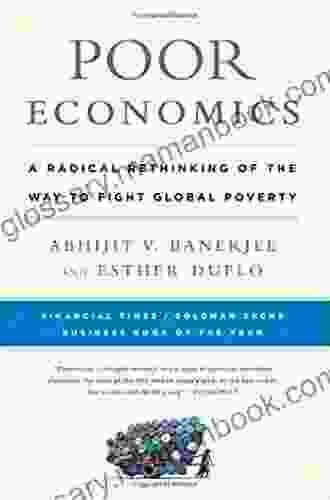Radical Rethinking Of The Way To Fight Global Poverty: Addressing Root Causes and Empowering the Underserved

Global poverty remains a persistent and pressing challenge, affecting millions of people worldwide. Traditional approaches to poverty reduction have often focused on short-term aid and handouts, which, while well-intentioned, have fallen short of addressing the underlying systemic issues that perpetuate poverty.
4.6 out of 5
| Language | : | English |
| File size | : | 1340 KB |
| Text-to-Speech | : | Enabled |
| Screen Reader | : | Supported |
| Enhanced typesetting | : | Enabled |
| X-Ray | : | Enabled |
| Word Wise | : | Enabled |
| Print length | : | 324 pages |
To effectively combat global poverty, a radical rethinking of our approach is required, one that acknowledges the complex and multifaceted nature of this challenge and prioritizes sustainable, long-term solutions. This article explores the root causes of global poverty, advocates for a paradigm shift in our approach, and emphasizes the vital role of empowering marginalized communities and promoting equitable access to resources.
Understanding the Root Causes of Global Poverty
To effectively address global poverty, it is crucial to understand its underlying causes, which are often deeply rooted in systemic inequalities, lack of opportunity, and structural barriers. Some of the key root causes include:
- Inequality: Disparities in income, wealth, and access to essential services perpetuate poverty, creating a vicious cycle that is difficult to break.
- Lack of Opportunity: Limited access to quality education, healthcare, and employment opportunities hinders individuals and communities from improving their lives.
- Structural Barriers: Discriminatory practices, corruption, and inadequate governance systems create obstacles to economic and social progress, especially for marginalized groups.
- Conflict and Instability: Violence, displacement, and political unrest disrupt livelihoods, destroy infrastructure, and exacerbate poverty.
- Environmental Degradation: Climate change, deforestation, and pollution disproportionately impact poor communities, undermining their ability to meet their basic needs.
Paradigm Shift: A New Approach to Poverty Reduction
To address the complex challenges of global poverty, a paradigm shift is necessary. This shift must prioritize sustainable, long-term solutions that empower marginalized communities, promote equitable access to resources, and foster inclusive growth. Key elements of this new approach include:
- Empowerment: Enabling impoverished communities to participate actively in decision-making processes and providing them with the resources and skills they need to improve their own lives.
- Equity: Ensuring fair and equal access to essential services, such as healthcare, education, and clean water, for all members of society, regardless of their background or circumstances.
- Sustainability: Promoting environmentally friendly practices, investing in renewable energy, and adopting sustainable agricultural techniques to ensure the long-term viability of poverty reduction efforts.
- Collaboration: Fostering partnerships between governments, non-governmental organizations (NGOs),the private sector, and community organizations to leverage collective resources and expertise.
- Innovation: Encouraging the development and implementation of innovative solutions, such as mobile banking, telemedicine, and social enterprises, to address the unique challenges faced by impoverished communities.
Empowering Marginalized Communities
Empowering marginalized communities is essential for sustainable poverty reduction. This involves providing them with access to quality education, healthcare, and economic opportunities, while also respecting and valuing their cultural identities and traditional knowledge.
- Investing in Education: Providing quality education for all, especially girls and children from disadvantaged backgrounds, is crucial for breaking the cycle of poverty and fostering social mobility.
- Promoting Access to Healthcare: Ensuring access to affordable and quality healthcare is vital for improving the health and well-being of impoverished communities and reducing infant mortality rates.
- Creating Economic Opportunities: Providing training and employment opportunities, supporting small businesses, and promoting entrepreneurship can empower individuals and families to lift themselves out of poverty.
- Respecting Cultural Identity: Acknowledging and valuing the cultural identities and traditional knowledge of marginalized communities is essential for empowering them and fostering inclusive growth.
- Promoting Participation: Ensuring that marginalized communities have a voice in decision-making processes and are actively involved in shaping their own futures is crucial for sustainable poverty reduction.
Promoting Equitable Access to Resources
Equitable access to essential resources, such as land, water, and financial services, is essential for reducing poverty and fostering inclusive growth.
- Land Reform: Implementing land reforms to ensure equitable access to land and protect the rights of smallholder farmers is crucial for reducing rural poverty and improving food security.
- Water Security: Providing access to clean and affordable water for all, especially in water-scarce regions, is essential for improving health, sanitation, and economic development.
- Financial Inclusion: Expanding access to financial services, such as microfinance and mobile banking, can empower individuals and small businesses to invest in their futures and break the cycle of poverty.
- Universal Basic Income (UBI): Implementing UBI programs can provide a safety net for the poorest and most vulnerable members of society, ensuring that they have the basic resources to meet their essential needs.
- Tax Justice: Reforming tax systems to ensure that the wealthy and corporations pay their fair share of taxes can generate revenue for essential social services and reduce inequality.
The Role of Technology in Poverty Reduction
Technology can play a significant role in poverty reduction by increasing access to information, services, and economic opportunities.
- Mobile Banking: Mobile banking can provide financial services to even the most remote and underserved communities, empowering them to manage their finances and invest in their futures.
- Telemedicine: Telemedicine can provide access to healthcare for people in rural and isolated areas, improving health outcomes and reducing infant mortality rates.
- Distance Education: Distance education programs can provide quality education to individuals who may not have access to traditional educational institutions, empowering them to improve their skills and knowledge.
- Social Entrepreneurship: Social enterprises can use technology to develop innovative solutions to social problems, such as affordable housing, renewable energy, and access to clean water.
- Data Analytics: Data analytics can help identify areas of greatest need, track progress, and evaluate the effectiveness of poverty reduction programs, ensuring that resources are used efficiently and targeted to those who need them most.
Global poverty is a complex and multifaceted challenge, but it is one that we can overcome. By radically rethinking our approach to poverty reduction, prioritizing sustainable solutions, empowering marginalized communities, and promoting equitable access to resources, we can create a more just and equitable world for all.
This paradigm shift requires the collective effort of governments, non-governmental organizations, the private sector, and civil society. It requires us to challenge the status quo, embrace innovation, and work together to ensure that everyone, regardless of their circumstances, has the opportunity to live a life of dignity and prosperity.
By investing in the empowerment of the poor and the promotion of equity and justice, we can break the cycle of poverty and create a better future for all.
4.6 out of 5
| Language | : | English |
| File size | : | 1340 KB |
| Text-to-Speech | : | Enabled |
| Screen Reader | : | Supported |
| Enhanced typesetting | : | Enabled |
| X-Ray | : | Enabled |
| Word Wise | : | Enabled |
| Print length | : | 324 pages |
Do you want to contribute by writing guest posts on this blog?
Please contact us and send us a resume of previous articles that you have written.
 Top Book
Top Book Novel
Novel Fiction
Fiction Nonfiction
Nonfiction Literature
Literature Paperback
Paperback Hardcover
Hardcover E-book
E-book Audiobook
Audiobook Bestseller
Bestseller Classic
Classic Mystery
Mystery Thriller
Thriller Romance
Romance Fantasy
Fantasy Science Fiction
Science Fiction Biography
Biography Memoir
Memoir Autobiography
Autobiography Poetry
Poetry Drama
Drama Historical Fiction
Historical Fiction Self-help
Self-help Young Adult
Young Adult Childrens Books
Childrens Books Graphic Novel
Graphic Novel Anthology
Anthology Series
Series Encyclopedia
Encyclopedia Reference
Reference Guidebook
Guidebook Textbook
Textbook Workbook
Workbook Journal
Journal Diary
Diary Manuscript
Manuscript Folio
Folio Pulp Fiction
Pulp Fiction Short Stories
Short Stories Fairy Tales
Fairy Tales Fables
Fables Mythology
Mythology Philosophy
Philosophy Religion
Religion Spirituality
Spirituality Essays
Essays Critique
Critique Commentary
Commentary Glossary
Glossary Bibliography
Bibliography Index
Index Table of Contents
Table of Contents Preface
Preface Introduction
Introduction Foreword
Foreword Afterword
Afterword Appendices
Appendices Annotations
Annotations Footnotes
Footnotes Epilogue
Epilogue Prologue
Prologue Kassandra Flamouri
Kassandra Flamouri Marilyn Shepherd
Marilyn Shepherd Conrad Aiken
Conrad Aiken Anne Weber
Anne Weber Frankie Love
Frankie Love Blake Pierce
Blake Pierce Simon Hugo
Simon Hugo Beverly Sade
Beverly Sade Bob Blaisdell
Bob Blaisdell Rich Fettke
Rich Fettke Alkevia Curry
Alkevia Curry Abd El Raouf Emad
Abd El Raouf Emad Ian Graham
Ian Graham Malcolm Guite
Malcolm Guite Logan Rankin
Logan Rankin Deandre Dean
Deandre Dean Jackie Bolen
Jackie Bolen Jen Carrigan
Jen Carrigan Abhay K
Abhay K Abigail Friedman
Abigail Friedman
Light bulbAdvertise smarter! Our strategic ad space ensures maximum exposure. Reserve your spot today!

 Chad PriceDiscover the Enchanting World of the Darling Buds Shawl: A Knitter's Guide to...
Chad PriceDiscover the Enchanting World of the Darling Buds Shawl: A Knitter's Guide to...
 Henry David ThoreauUnveiling the Visionary Leadership of Dr. Brent Manke in Morning Rounds: A...
Henry David ThoreauUnveiling the Visionary Leadership of Dr. Brent Manke in Morning Rounds: A...
 Yasushi InoueLitRPG Ability Extraction System Apocalyptic LitRPG Cultivation Vol. 1: A...
Yasushi InoueLitRPG Ability Extraction System Apocalyptic LitRPG Cultivation Vol. 1: A... Ethan MitchellFollow ·15.6k
Ethan MitchellFollow ·15.6k VoltaireFollow ·13.7k
VoltaireFollow ·13.7k Douglas AdamsFollow ·11.3k
Douglas AdamsFollow ·11.3k Fred FosterFollow ·5k
Fred FosterFollow ·5k John KeatsFollow ·17.5k
John KeatsFollow ·17.5k Franklin BellFollow ·5.9k
Franklin BellFollow ·5.9k Tyler NelsonFollow ·4.1k
Tyler NelsonFollow ·4.1k Al FosterFollow ·2.8k
Al FosterFollow ·2.8k

 Cody Blair
Cody BlairWill You Ever Pee Alone Again? The Future of Bathroom...
The bathroom has long been a place of...

 Al Foster
Al FosterNine Years Among the Indians 1870-1879: Witnessing Their...
In the annals of American...

 Pete Blair
Pete BlairYekl and the Imported Bridegroom: A Window into the New...
Abraham Cahan's Yekl and the...

 Pablo Neruda
Pablo NerudaSearch Engine Optimization Guide: A Non-Technical...
In today's digital landscape, having a...

 Nikolai Gogol
Nikolai GogolOne Piece Vol 77: Smile - The Saga Continues with...
The Enthralling World...

 Dan Henderson
Dan HendersonThree Farmers On Their Way To Dance
In a quaint countryside...
4.6 out of 5
| Language | : | English |
| File size | : | 1340 KB |
| Text-to-Speech | : | Enabled |
| Screen Reader | : | Supported |
| Enhanced typesetting | : | Enabled |
| X-Ray | : | Enabled |
| Word Wise | : | Enabled |
| Print length | : | 324 pages |






